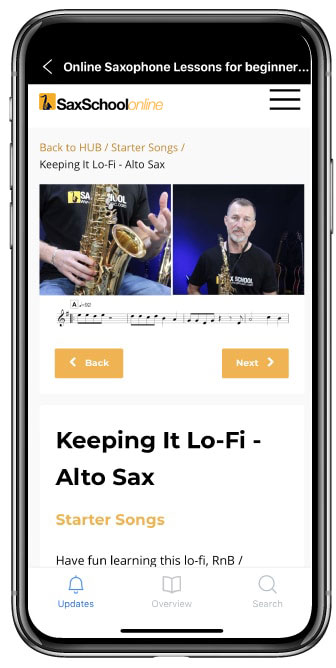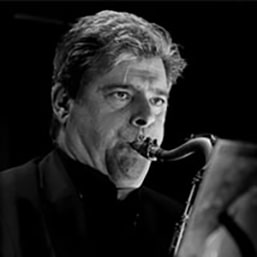Playing sax for a theatre show
What's it like to play in a band for a musical stage show? Sax player and student Brooke Jessop shares her experience of playing...
Read More
I’m so grateful I came across your website (via YouTube). Sax School is so professional and engaging – and for the beginner, very well laid out. I also really appreciate your warm and encouraging coaching style, something missing in quite a few other websites!
Louise Ramsay, Scotland

I’m very impressed by the structure of your lessons, and how you have created a worldwide community for us. This is a big advantage for newcomers to saxophone. I have myself spent over 30 years teaching adults and I want to compliment you on your excellent courses!
Hans Nava-Barrefors ,Sweden

I started sax at 73 and your lessons have already helped me play so much better. I got to play in front of an audience of over 100 people and from the applause I think they enjoyed it! Thanks for your help Nigel!
John Whitt ,Oregon, USA
Struggling to get started? Experiencing a bit of performance anxiety? Hit a plateau? We know what it’s like… it can be excruciatingly frustrating. All you want is to play the saxophone like you hear in your favourite songs – or how you imagine in your mind.
From the basics of embouchure, to playing at speed and the pinnacles of altissimo, Sax School teaches you the skills and confidence to be the sax player you want to be.
No heavy textbooks, mind-numbing theory or tedious lesson plans. Just incredibly effective, engaging, ‘play-as-you-watch’ online saxophone lessons that always keep you motivated to learn.
Sure, playing sax off sheet music is incredibly satisfying. But improvising and going where the music takes you – that’s the ultimate goal for just about every sax player.
With Sax School, we break down the art of improvisation, teaching you the step-by-step techniques your favourite pros use to improvise at a moment’s notice.
In no time, you can learn to ditch the sheet music and play the saxophone by memory and ear, setting off on an improvised musical journey anytime you pick up the sax.
What’s your jam… Blues, ska, jazz, pop, gospel? Whatever lights up your earbuds, you can learn it with Sax School.
Choose the tunes you love from a near-endless selection of songs – it’s the music you actually want to play, not what a teacher tells you to play.
Play all-time favourites for yourself, friends and family – or own the stage as part of a pub or community band. Even lay down your own recording. After all, what sax player doesn’t dream of that?
With Sax School, you learn on-demand from your living room, bedroom or
garage. All it takes is a laptop, tablet or smartphone. Not just amazingly effective,
but convenient too.

Find lessons matched precisely to your skill level and what you want to learn next. Never get bored,
stuck or left behind. You’re in control of the speed of your learning – and your starting point.
Sax School members from all over the world connect, co-create and learn together in the most vibrant and
supportive saxophone-playing community going around.
“Nigel helped me go from absolute beginner to knowing over 30 tunes, and playing regularly with a band in my area!”
Mindy Weaver ,USA
“Sax School has really increased my enjoyment of learning saxophone and I love being able to work through things at my own pace”
Richard Stubley ,Sydney Australia
“With no teacher near me Sax School completely changed the way I could learn and enjoy playing saxophone. It’s great fun!”
Susanne Pearce ,Sweden / Scotland
“Nigel is a great teacher and my progress on saxophone has been down to the help I have received from Sax School”
Stephen Power ,Ireland
“Through Sax School Nigel has helped me learn saxophone from scratch. I like that I can learn when I want and at my own pace”
Martin Sweeny ,UK
“Nigel is a fantastic teacher and a great communicator. I’m always amazed at the range of resources in Sax School and how I can use them over and over”
Gerry Smith ,UK

Sax man with Average White Band, touring and recording pro, and YOUR Sax School tutor. How is awesome is that?

Australian SKA and Blues touring legend Dean will help you supercharge your tone and improvising skills.

Performing and recording on sax and keys, songwriter and arranger, tech whizz and Sax School Tutor – you definitely want Chris on your team.

As Principal Lecturer in Jazz Sax for over 20 years at the prestigious Leeds Conservatoire, Joel is considered one of the top jazz educators in the UK.

The man with the Sax School vision. International touring sax player and band leader. Teaching saxophone is Nigel’s passion.

Build killer Pop Sax skills with Matt and learn from his experience performing with Brandon Flowers (The Killers) and opening for Justin Timberlake!

Building your career (Blues Brothers, Aretha, SNL, Zappa, Steely Dan, Aerosmith and more!)

From the best courses, to Tutor Support and a Worldwide Supportive Community, Sax School gives you everything you need to succeed on your saxophone.
Education can be expensive. But mistakes and wasted time is far more costly.
We only want you to pay if you actually LOVE using Sax School! So join below to try out our online course and lesson completely risk free. If it’s not for you, simply cancel your membership within 90 days and contact support for a full refund.
What's it like to play in a band for a musical stage show? Sax player and student Brooke Jessop shares her experience of playing...
Read MoreWant to develop an even technique on saxophone and learn how to get those difficult lines up to speed? Well, join the club. We...
Read MoreDo you want to be able to access the full range of your dynamics on saxophone? Do you want your low and your high...
Read MoreReady to hit the perfect note every time, improvise like a pro
and play your favourite tunes?